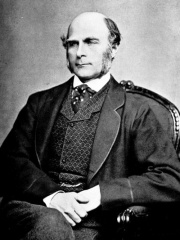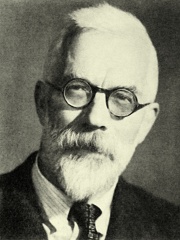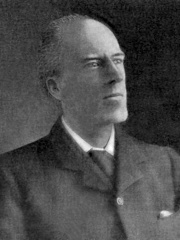



The Most Famous
STATISTICIANS from United Kingdom
This page contains a list of the greatest British Statisticians. The pantheon dataset contains 8 Statisticians, 4 of which were born in United Kingdom. This makes United Kingdom the birth place of the most number of Statisticians.
Top 4
The following people are considered by Pantheon to be the most legendary British Statisticians of all time. This list of famous British Statisticians is sorted by HPI (Historical Popularity Index), a metric that aggregates information on a biography's online popularity.

1. Francis Galton (1822 - 1911)
With an HPI of 74.03, Francis Galton is the most famous British Statistician. His biography has been translated into 61 different languages on wikipedia.
Sir Francis Galton (; 16 February 1822 – 17 January 1911) was an English polymath and the originator of eugenics during the Victorian era; his ideas later became the basis of behavioural genetics. Galton produced over 340 papers and books. He also developed the statistical concept of correlation and widely promoted regression toward the mean. He was the first to apply statistical methods to the study of human differences and inheritance of intelligence, and introduced the use of questionnaires and surveys for collecting data on human communities, which he needed for genealogical and biographical works and for his anthropometric studies. He popularised the phrase "nature versus nurture". His book Hereditary Genius (1869) was the first social scientific attempt to study genius and greatness. As an investigator of the human mind, he founded psychometrics and differential psychology, as well as the lexical hypothesis of personality. He devised a method for classifying fingerprints that proved useful in forensic science. He also conducted research on the power of prayer, concluding it had none due to its null effects on the longevity of those prayed for. His quest for the scientific principles of diverse phenomena extended even to the optimal method for making tea. As the initiator of scientific meteorology, he devised the first weather map, proposed a theory of anticyclones, and was the first to establish a complete record of short-term climatic phenomena on a European scale. He also invented the Galton whistle for testing differential hearing ability. Galton was knighted in 1909 for his contributions to science. He was Charles Darwin's half-cousin. In recent years, he has received significant criticism for being a proponent of social Darwinism, eugenics, and biological racism; indeed he was a pioneer of eugenics, coining the term itself in 1883. Galton is credited with popularizing the phrase "nature versus nurture" to frame the academic discussion regarding the relative influence of heredity and environment on human ability and social advancement.

2. Thomas Bayes (1702 - 1761)
With an HPI of 70.42, Thomas Bayes is the 2nd most famous British Statistician. His biography has been translated into 50 different languages.
Thomas Bayes ( BAYZ; c. 1701 – 7 April 1761) was an English statistician, philosopher and Presbyterian minister who is known for formulating a specific case of the theorem that bears his name: Bayes' theorem. Bayes never published what would become his most famous accomplishment; his notes were edited and published posthumously by Richard Price.

3. Ronald Fisher (1890 - 1962)
With an HPI of 69.05, Ronald Fisher is the 3rd most famous British Statistician. His biography has been translated into 57 different languages.
Sir Ronald Aylmer Fisher (17 February 1890 – 29 July 1962) was a British polymath who was active as a mathematician, statistician, biologist, geneticist, and academic. He has been described as "a genius who almost single-handedly created the foundations for modern statistical science" and "the single most important figure in 20th century statistics". In genetics, Fisher was the one to most comprehensively combine the ideas of Gregor Mendel and Charles Darwin, as his work used mathematics to combine Mendelian genetics and natural selection; this contributed to the revival of Darwinism in the early 20th-century revision of the theory of evolution known as the modern synthesis. For his contributions to biology, Richard Dawkins declared Fisher to be the greatest of Darwin's successors. He is also considered one of the founding fathers of Neo-Darwinism. According to statistician Jeffrey T. Leek, Fisher is the most influential scientist of all time on the basis of the number of citations of his contributions. From 1919, he worked at the Rothamsted Experimental Station for 14 years; there, he analyzed its immense body of data from crop experiments since the 1840s, and developed the analysis of variance (ANOVA). He established his reputation there in the following years as a biostatistician. Fisher also made fundamental contributions to multivariate statistics. Fisher founded quantitative genetics, and, together with J. B. S. Haldane and Sewall Wright, is known as one of the three principal founders of population genetics. Fisher outlined Fisher's principle, the Fisherian runaway, the sexy son hypothesis theories of sexual selection, parental investment, and also pioneered linkage analysis and gene mapping. On the other hand, as the founder of modern statistics, Fisher made countless contributions, including creating the modern method of maximum likelihood and deriving the properties of maximum likelihood estimators, fiducial inference, the derivation of various sampling distributions, founding the principles of the design of experiments, and much more. Fisher's famous 1921 paper alone has been described as "arguably the most influential article" on mathematical statistics in the twentieth century, and equivalent to "Darwin on evolutionary biology, Gauss on number theory, Kolmogorov on probability, and Adam Smith on economics", and is credited with completely revolutionizing statistics. For his influence and numerous fundamental contributions, he has been described as "the most original evolutionary biologist of the twentieth century" and as "the greatest statistician of all time". His work is further credited with later initiating the Human Genome Project. Fisher also contributed to the understanding of human blood groups. Fisher has also been praised as a pioneer of the Information Age. His work on a mathematical theory of information ran parallel to the work of Claude Shannon and Norbert Wiener, though based on statistical theory. A concept to have come out of his work is that of Fisher information. He also had ideas about social sciences, which have been described as a "foundation for evolutionary social sciences". Fisher held strong views on race and eugenics, insisting on racial differences. Although he was clearly a eugenicist, there is some debate as to whether Fisher supported scientific racism (see § Views on race). He was the Galton Professor of Eugenics at University College London and editor of the Annals of Eugenics.

4. Karl Pearson (1857 - 1936)
With an HPI of 68.56, Karl Pearson is the 4th most famous British Statistician. His biography has been translated into 51 different languages.
Karl Pearson (; born Carl Pearson; 27 March 1857 – 27 April 1936) was an English biostatistician and mathematician. He has been credited with establishing the discipline of mathematical statistics. He founded the world's first university statistics department at University College London in 1911, and contributed significantly to the field of biometrics and meteorology. Pearson was also a proponent of Social Darwinism and eugenics, and his thought is an example of what is today described as scientific racism. Pearson was a protégé and biographer of Sir Francis Galton. He edited and completed both William Kingdon Clifford's Common Sense of the Exact Sciences (1885) and Isaac Todhunter's History of the Theory of Elasticity, Vol. 1 (1886–1893) and Vol. 2 (1893), following their deaths.
People
Pantheon has 4 people classified as British statisticians born between 1702 and 1890. Of these 4, none of them are still alive today. The most famous deceased British statisticians include Francis Galton, Thomas Bayes, and Ronald Fisher.
Deceased British Statisticians
Go to all RankingsFrancis Galton
1822 - 1911
HPI: 74.03
Thomas Bayes
1702 - 1761
HPI: 70.42
Ronald Fisher
1890 - 1962
HPI: 69.05
Karl Pearson
1857 - 1936
HPI: 68.56
Overlapping Lives
Which Statisticians were alive at the same time? This visualization shows the lifespans of the 4 most globally memorable Statisticians since 1700.

